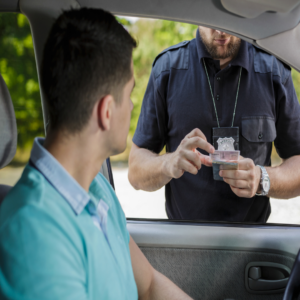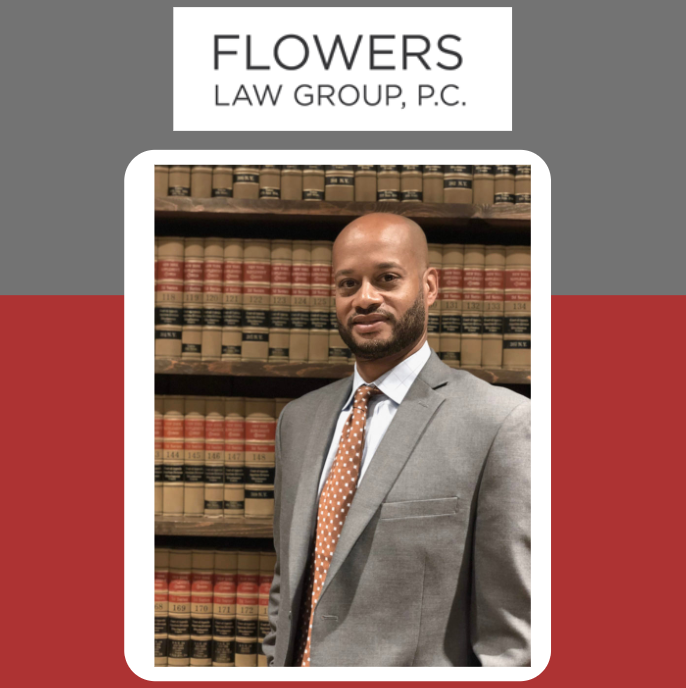In need of one of the top law firms in Long Island, NY? Fill out the form below!
About Our Experienced Lawyer in Huntington: Larry E. Flowers, Esq.
Larry Flowers is a Lawyer in Huntington as well as a criminal and civil trial attorney that has taken several cases to favorable verdicts; including but not limited to, DWI, assault, sexual assault, criminal contempt, landlord/tenant, custody and support matters, and asset forfeitures.
Larry Flowers has been successful in having criminal charges dismissed after conducting pre-trial hearings and on his motion practice. Mr. Flowers has counseled clients through the drug court programs, ultimately avoiding criminal convictions and helping them understand and gain treatment for their addictions.
He has developed a style of his own that has proved very effective with both Judges and Assistant District Attorneys. His clients have come to know that he will analyze their situations with an experienced and critical eye and that he will construct the most persuasive and solid argument possible. Larry Flowers’ promise of integrity, respect, and professionalism has helped forge a solid reputation with his clients and in the courts which he practices.
What Are Our Primary Practice Areas?
Hit and Run Accidents
A hit and run accident occurs when a motorist hits another vehicle, person, or property and does not stop to give vital information such as their name, insurance information, drivers license information, or other required statements to the victim or local governing authority. Hit and run laws are different depending on what state and county that they occurred. It is not a violation of your constitutional rights to provide this information because it is a required report and not an admission of guilt. If you’re guilty of committing a hit and run crime, our lawyer in Huntington can give you the help you need. Contact Flowers Law Group today for the information and representation that you need!
How do hit and runs work?
Hit and runs in New York State can be considerable offenses, especially if someone is injured as a result. Leaving the scene of an accident without exchanging insurance information or waiting to file a police report can have effects with significant consequences. If no one is injured, by New York State law, a police report is not required, but you still have to provide insurance information. However, it is recommended for a police officer to write a report in this case to determine the cause of the accident and who is at fault. If someone is injured, the law requires you to contact and wait for a police officer to file a report.
What are the consequences?
Drivers who leave the scene of an accident and do not file a required report can face a variety of charges:
- Fines up to $250 for regular accidents and fines up to $5,000 for injury incidents.
- Three points on your license if you are convicted of a hit and run.
- Your license can be revoked for non-commercial drivers who leave the scene of an injury. Commercial drivers can have their licenses revoked for leaving the scene of a non-injury incident.
- A person can spend 15 days in jail for leaving the scene of a non-injury accident. In the case of injury, a person who leaves the scene of an accident without filing an official report or refusing to provide an officer with the required information can spend up to one year in jail.
- If convicted, you’re at risk of a permanent criminal record.
Although these charges are immense, it is common for people to be accused of such crimes and not be entirely at fault. Our lawyer in Huntington can represent you if you find yourself in this predicament. A common reason that some individuals may be accused of a hit and run is that the accused party may not even know they were in an accident. This is quite common in cases of none-injury incidents. In some cases, a person may not have thought there was any damage to the vehicle or person and was “waived” on to leave the scene.
If you are in this type of situation and need a lawyer in Huntington, then you should contact Flowers Law Group as soon as possible. You may not be at fault and may be falsely accused. Don’t take these matters lightly and be vigilant in protecting your civil liberties.
Criminal Mischief
Criminal mischief is when a person damages another person’s property without his or her consent. More specifically, it is a crime governed by state laws that note, when someone damages tangible property of another purposefully, it is considered an act of criminal mischief. This tangible item is not taken but is defaced, altered, or damaged without permission. The amount of damage done can range from minor to massive. No matter how small the destruction, it still counts as an act of criminal mischief. If you believe you have been charged for damaging property, you should contact our lawyer in Huntington, Flowers Law Group.
What Does an Act of Criminal Mischief Look Like?
Criminal mischief can range from vandalism to using explosives that cause intentional damage. This action cannot be committed by accident. For example, if someone was playing baseball and hit a ball into your window on accident, this is not considered criminal mischief. However, if someone was to take a baseball bat and intentionally smash it into your window, this qualifies as criminal mischief. Flowers Law Group and our lawyer in Huntington can help you if you’ve been caught in the act of criminal mischief.
What are the Consequences of Criminal Mischief?
The consequences of criminal mischief vary from case to case and from state to state. These penalties can be classified as a misdemeanor or a felony depending on the severity of the case. Penalties can include:
- Jail or prison – This sentence depends on the amount of damage.
- Fines – This is the most common penalty for criminal mischief.
- Restitution – Paying the property owner the amount of money for the damage done.
- Probation – Reporting to a probation officer to maintain appropriate behaviors.
Family Law – Visitation
Divorce is painful enough. Between the blood sweat and tears, the last thing a divorced couple wants to worry about is not being able to see their child. Unfortunately, it’s not likely that the divorced couple is going to stay in the same household, which means custody and visitation rights need to be granted. Neither visitation nor custody is black and white subject matters. There are a lot of factors that affect the outcome of both.
A parent that is granted child visitation means that they are allowed to visit the child when the visitation schedule allows it. Whereas, a parent that is granted custody of their child means that they are the ultimate decision-maker when it comes to their child. The different types of visitation include the following:
Supervised visitation
This is granted when the court allows a parent to visit their child, but only if another adult (social worker, family member,etc.) is present. The purpose of this is to ensure the child’s safety. This may be granted if the parent has a history of drugs or violence, mental illness, abandoned the child in some way, etc. The visits are determined in a location of the judge’s choosing and are watched by a monitor or person other than the adult supervisor. If the parent does everything the courts ask them to, they can potentially acquire supervised visitation at a future date.
Unsupervised visitation
This is granted when the court allows a parent to visit their child without anyone else present. In order to receive this court order, the judge has to see the person as fit to take care of their child. A lawyer can help a person prove that they’re a fit parent to the courts
Therapeutic supervised visitation
This granted when the court allows a person to visit their child, but only if a therapist is present. The purpose of this order is to help improve the relationship between the person it was granted to and their child. Instead of a monitor, the therapist keeps track of the person’s progress with the child.
How is it decided the amount of time you are able to spend with your child?
Deciding which parent should be able to be in their child’s life and for how long is a very complicated process. If it were up to the parents, most people would probably choose to spend every second they can with their child. For this reason, it’s left up to the courts to decide the best interests of the child. Some factors that determine custody and visitation rights are the following:
- Emotional Intelligence– Being a good parent is about more than just feeding, clothing, and picking up your child from school. It takes emotional intelligence. A good parent has to know how to love and communicate with their child. This includes their child’s likes and dislikes, their child’s strengths and weaknesses, showing affection toward the child, etc.
- Stability– Kids are very expensive. Younger children need diapers, formula, toys, etc. As they age they need someone to pay for their education, clothes, and entertainment. Therefore, a parent needs to have the financial stability to be able to properly support and provide for their child. A good parent also needs to be able to provide a good home for the child to grow up in, since the child doesn’t have the ability to do that on their own.
- Safety– If there is a question about the parent’s mental health, history of substance abuse, violence, etc. The courts are not going to put the child in harm’s way and will perform background checks when making the court order.
Contact Flowers Law Today For A Lawyer in Huntington
Overall, visitation is more than just showing up and spending time with the child. There are many different types (Supervised, unsupervised, and therapeutically supervised) of visitation each with their own unique circumstances. The type of visitation granted will be up to the judge and will be based on safety, stability, and emotional intelligence. If you are a parent that is in the middle of a custody/visitation battle, get in touch with a lawyer in Huntington at Flowers Law to receive the expert knowledge that you need to settle your dispute.
Is Parole Worse Than Probation?
Are you aware of the differences between parole and probation? An offender needs to know these differences. Depending on the offender’s activity in jail, they may receive either parole or probation. From there, their behaviors and actions will determine their result. If you want to find a Lawyer in Huntington that you can trust, contact Flowers Law.

Understanding Parole – Lawyer in Huntington
Parole is the permission for a prisoner to be released before their period in prison is finished. As a parolee, you must follow the specific rules or risk going back into custody. Some of the most common conditions of parole include:
- Maintaining a residence and employment
- Avoiding criminal activity
- Refraining from drugs and alcohol while also attending recovery meetings
- Not leaving the specific geographic area without permission
Any violations can lead to parolees returning to jail. If you have any questions about parole, consider speaking to lawyers at Flowers Law Lawyer in Huntington.
Understanding Probation
Probation is a period of supervision over an offender. The offender can be released to their homes but must follow certain rules and guidelines. There are certain conditions of probation, depending on the crime charged, that must be followed. Some of the most common conditions of probation include:
- Reporting to a probation officer monthly.
- Paying restitution and court costs.
- Getting drug treatment and counseling.
- No new crimes can be committed.
- Any interaction with law enforcement must be reported.
- Follow curfews.
- Do not change your residence or leave the country without permission from your probation officer.
Once you complete all your conditions, your sentence will be over, and you can be released from probation. If you have any questions about probation, consider speaking to lawyers at Flowers Law Lawyer in Huntington.
The Difference Between Parole and Probation
Parole and probation are similar in many ways but have many differences, so which is better? Parole begins at the end of the sentence, where the prisoner spends the rest of their time participating in community service and active programs. On the other hand, probation stops the sentence, but it could resume if the individual violates the conditions. Probation is difficult in the sense that a single violation can lead to a resumed sentence. Those on probation are in constant contact with their probation officer, leading to heavy restrictions such as where they live and what jobs they can take. Parole has fewer limitations.
Flowers Law – Lawyer in Huntington
Flowers Law is dedicated to providing our clients with trustworthy and competitive legal representation. If you want to find a Lawyer in Huntington that you can trust, contact us today!
Driving With A Suspended License
Have you or someone you know recently been caught driving with a suspended license? This could be a severe misdemeanor or even felony in most states. That is why our Lawyer in Huntington is here to help you. Here at Flowers Law, we provide the help you need.

How Does Your License Get Suspended?:
- Having too many points on your license within 18 months
- Driving reckless
- Drug or alcohol use of minors
- Leaving the scene of the accident
- Driving while intoxicated
- Refusing to take a breathalyzer
- Drag Racing
- Driving without insurance
- Driving with fake license plates
What Happens When You Get Caught Driving With A Suspended License?:
- Criminal Offense- In New York, driving with an experienced driver’s license is a criminal offense and can leave you with a criminal record. It would be an AUO, aggravated unlicensed operation, and there are three levels: first, second and third-degree. The first degree is classified as a felony, and second and third degrees are classified as misdemeanors. Having a criminal offense on your record can impact things such as applying for a job.
- Jail- Driving with a suspended license could lead to up to thirty days of jail time in the third degree. If you are in the second, it could be one hundred and eighty days, and the first degree could be years.
- Fines- Driving with a suspended license could cause you to pay a lot in penalties. For third-degree charges, you will most likely pay between two hundred and five hundred dollars. If you are in the second or third degree, you should expect to pay much more, up to thousands of dollars.
- Increased Car Insurance- Driving with a suspended license will increase your car insurance by a lot, you will become a high-risk driver, and your insurance can go up as much as forty percent.
For more information about getting caught driving with a suspended license, click here or contact our Lawyer in Huntington.
Contact Our Lawyer in Huntington!
Our Lawyer in Huntington, Flowers Law, is here to help you with any legal assistance you need. We are dedicated to giving you the representation and justice you need. If you have legal complications contact us to make an appointment today!
What Is The Sentence For DWI?
Dealing with legal activity can be a stressful situation, no matter the severity of the crime. Having a trusted criminal defense lawyer provides much-needed relief in what seems to be a troubling period. Our Criminal Defense Lawyer specializes in assisting clients who require legal aid. One area that the Flowers Law Group NY specializes in is DWI sentences. We will discuss the differences between DWI and DUI. Additionally, what DWI charges Involve and how the Lawyer in Huntington can help you navigate this criminal area.
What Is The Difference Between DWI and DUI?

The meaning of DWI and DUI could vary depending on which state one commits the crime. In most cases, DWI and DUI do not mean the same thing. Typically DWI means driving while intoxicated, and DUI is defined as driving under the influence. Having DWI, or DUI, show up on your driver’s record can be intimidating. That is why it is important to make sure you work with the best Lawyer in Huntington possible at Flowers Law Group.
DWI And DUI Lawyer in Huntington
- DUI, or driving under the influence of alcohol or drugs. Drugs are classified as over-the-counter, prescription, and illegal.
- DWI, or driving while intoxicated or impaired.
A law enforcement officer can classify a driver as DUI or DWI if the driver shows signs of impairment while driving. Any substance that is taken, such as alcohol, or drugs can lead to a charge of DWI and DUI. The state of the driver determines what legal system will sentence the driver with. In some cases, a vehicle operator could be charged with OUI, OWl, or DWAI
- OUI – Operating under the influence
- OWI – Operating while intoxicated
- DWAI – Driving while ability impaired
What Are The Driving Drunk Limits and Laws?
Once again, the amount of BAC, or Blood Alcohol Concentration, depends on the state’s limits and laws. However, the highest your BAC can reach before it is illegal to get behind the wheel is 0.08%. If your BAC is at least 0.15%, then charges for drunk driving can increase. The way to determine your BAC is through a breathalyzer test, blood, or urine test. In New York, drunk or drugged driving charges are jail time, fines, and loss of driving privileges. Losing your driver’s license and forfeit your insurance could also take place.
Contact Our Lawyer in Huntington
If you or someone you know has been involved in driving while impaired or driving under the influence, go to our website to get the most trusted Lawyer in Huntington. We are willing to help the individuals get the best service and understanding of their situation. We understand the difficult times and are willing to help in any way we can contact us now!
Recent Blog Posts
What Differs Between Assault, Aggravated Assault, and Battery?

The terms assault and battery may be used interchangeably, however, assault, battery, and aggravated assault are separate charges with differing definitions. If you have an assault or battery case on your hands, contact Flowers Law Group, a criminal lawyer in Huntington, to fight for justice!
Our experienced attorney will provide you with representation that you can trust.
Assault
This is defined as intentionally threatening or attempting to physically harm another person, recognizing that causing another person to fear imminent harm is a punishable offense. Because of this definition, police officers can intervene and make arrests before a physical altercation arises, and prevent it from happening. To prove an assault, it must be proven that not only was there an intent to harm but also that the assailant was capable of causing such harm. If convicted, penalties may include a fine ranging from $1,000 to 5,000 and/or up-to 7 years in prison (depending upon the degree of assault).
Battery
This is the unconsented physical hitting, striking, or groping of another person. Unlike assault, battery must involve physical contact and harmful or offensive contact must be proven in court to bring a conviction. This may be shown through corroborating witnesses, photo/video evidence, etc. If convicted of battery, one may face up to $2,000 in fines and up to a year in jail. Our criminal lawyer in Huntington can assist you with your legal troubles in the event that you are involved in this type of incident.
Aggravated Assault
Unlike the other charges, this is considered a felony offense, as it is the most extreme degree of assault. There are a couple of factors that may distinguish a charge from simple to aggravated assault. If the assault involves a deadly weapon, the intent to commit a serious crime, such as rape, or harming a minor/elderly person, it will be considered an aggravated assault. In New York, causing severe bodily harm or attempting sexual contact with someone under 14 years old also falls under aggravated assault. If convicted, punishment for aggravated assault includes 3 – 25 years in prison and a fine of up to $5,000.
Lawyer in Huntington– Flowers Law Group
In need of some legal guidance? You need a skillful and experienced attorney on your side. Contact Flowers Law Group, a criminal lawyer in Huntington, today! We are dedicated to guiding our clients through the legal process every step of the way. Visit our website or give us a call at (631) 629-4720 to learn how we can help you!
How To Deal With Squatters On Your Property

The process of removing a squatter from your property can be tricky. Don’t trust just anyone to represent you in these matters. Contact Flowers Law Group, a criminal lawyer in Huntington, to begin the process today!
Adverse Possession, what is it?
Adverse Possession aka Squatter Rights is a legal term for occupying someone else’s property. A squatter must live on the property openly and without permission for at least 10 continuous years to claim adverse possession in New York. However, in New York, the laws differ. A squatter is granted adverse possession after just 30 days of unwelcome occupancy! Once the adverse possession period (whether 30 days or 10 years) has passed, the owner must go through the legal eviction process to remove the squatter. This is a lengthy and expensive process! And until it is completed, they have the legal right to continue living there.
How can you protect yourself?
- Ensure any tenantless properties are locked up and well-secured.
- If you have a vacant property, check it frequently – especially if you are in New York City! If you’re an absentee landlord, hire a property manager or seek out a family member/friend in the area to check on your behalf.
- Know your local laws
- Contact a criminal lawyer in Huntington to receive fair and honest representation.
What action can you take?
- Contact authorities
If you discover a squatter, it is important to immediately contact police. Timing is crucial, and the longer they stay there the more difficult it may be to evict. If the police find this to be a civil matter, then your next step is to begin the legal eviction process.
- Serve the proper forms that you have obtained
To file an eviction notice, there are 3 things you will need. They include:
- a Notice of Petition
- a Petition to Recover Possession of Real Property
- an Affidavit of Service
The Notice of Petition informs the tenant that the case has been filed along with the court date and location that has been set. The Petition to Recover Possession will explain the reason for this case is initially filed. The Affidavit of Service indicates how the squatter has been served (mail or hand delivery). Take the completed forms to court to file within 3 days of serving initial notice. If they still haven’t left after being served, you will have to attend court hearings. If you’ve won your lawsuit and they still will not vacate the property, contact a sheriff or police officer to remove them.
Lawyer in Huntington
If you are a landlord or tenant, in need of representation contact Flowers Law Group, a criminal lawyer in Huntington, to explore your options! Dealing with legal matters can be difficult and stressful. Let us walk you through this process every step of the way.
Was Your License Recently Suspended?
Did you recently find out that your license was suspended, and are not sure what to do next? When you are not able to drive for any amount of time it can be very detrimental to someones everyday life. The time frame of a license being suspended can vary on what type of violation you received. The lengths in which you will need to go to get your license back can vary based on the state. If you are looking for a Lawyer in Huntington, Flowers Law Group can help you today with all your troubles. Continue reading to understand the process of how and why your license could be suspended.
Often a lot of people do not think about losing their driver’s license while rolling through a stop sign or texting while driving. But the result could mean a suspended license for a few months or even years.
Below you will find several different reasons why one’s license could be suspended:
Insurance
If you are driving around with an uninsured vehicle and you get pulled over or into an accident it could lead to suspension of your license or even worst the DMV can revoke your license entirely.
Driving While Intoxicated
- If you get behind the wheel or any type of motorized vehicle it could lead to severe crime. While under the influence, it causes slow reaction time, loss of concentration, blurry vision, and much more. If you or someone you know who recently had a DWI contact Flowers Law Group, a Lawyer in Huntington.
Receiving Too Many Traffic Tickets
- In the United States, your driving tickets are tracked by the number of points a driver gets from a ticket. If you hit a certain amount of tickets and points on your license, eventually your license may be suspended or revoked. Suspension of a license can also be caused by not paying for your traffic tickets.
Failure To Pay For Child Support
- The DMV could suspend your license when the NYS Office contact them about unpaid child support.
Unpaid State Tax Debts
- This can depend on what state you live in, but the DMV will send you a pre-suspension notice, before your suspension date. And if the person fails to resolve their debt, the DMV will suspend the driver’s license on the exact date they notified you.
Lawyer in Huntington
If you or someone you know has recently found out their license is going to be suspended a Lawyer in Huntington can help you today. Contact Flowers Law Group if you have any additional questions so we can advocate for you.
What Are The Types Of Intimate Partner Violence
No one ever expects their loved ones to hurt them. Unfortunately, cases of intimate partner violence continue to be reported each year. The team at Flowers Law Group is no stranger to these events and can offer assistance to victims in need. Our Lawyer in Huntington will walk you through the four types of intimate partner violence and help you seek justice after one of these acts occurs.
Who Does Intimate Partner Violence Affect?

If you have experienced violence at the hands of your partner, you must remember that you are not alone. Millions of people are affected by intimate partner violence, as 1 in 4 women and 1 in 10 men in the United States face this each year. This violence does not have to be physical, as an estimated 43 million women and 38 million men will experience physiological aggression from their partner at one point in their lifetime. Don’t become just a statistic, contact our Lawyer in Huntington if you’ve become a victim so action can be taken.
The Four Types:
Intimate partner violence is not limited to acts committed by your current partner. Past spouses or partners can also be found guilty of this type of violence. It can be just one isolated incident that has had a lasting effect, or it can be chronic attacks that last for several years. Intimate partner violence is broken out into four categories which include:
- Physical Violence: An action that hurts a person using physical force.
- Psychological Aggression: A form of verbal or non-verbal communication aimed at causing trauma to or exerting control over a person.
- Sexual Violence: Attempting to or forcing a person to take part in a sexual act without consent.
- Stalking: Repeatedly contacting or showing attention to a person with the attempt to harm or exert control over them.
How Our Lawyer in Huntington Can Help?
After falling victim to an act of intimate partner violence, it’s easy to feel helpless. Flowers Law Group is very aware of this but can help you take back control. Our Lawyer in Huntington can work with you to build a case against your partner to ensure they are punished for their violence. Monetary damages can be recouped, and restraining orders can be drafted to help keep you safe.
At Flowers Law Group, we want all our clients to trust in our services. Our Lawyer in Huntington will work tirelessly to create a favorable case to recoup any damages you’re entitled to and help keep you safe. If you’ve fallen victim to intimate partner violence, contact our firm today.
What is a White Collar Crime?
When most people think of crimes, they think of violent acts such as robbery, theft, and so on. Yet there are plenty of crimes that are nonviolent but can still debilitate people and cause damage. Many nonviolent crimes revolve around finances. These crimes that are done for financial gain, are often perpetrated by people with some form of power or who use their position and deceit to exploit their targets, which are considered white-collar crimes. These crimes include fraud, embezzlement, tax evasion, and many others. The name white-collar crime comes from what was the typical outfit for these criminals, who could be business people, politicians, or other high-ranking professionals. If you are having issues with white-collar crimes, and need to talk to a Lawyer in Huntington, reach out to Flowers Law Group P.C. to find out how we can help.
Examples of White Collar Crimes

There are a plethora of crimes that fall under the category of white-collar crimes. Some may be more common than others. If you have been charged with, or are caught up in a problem involving one of these crimes, call Flowers Law Group to speak with a Lawyer in Huntington!
- Fraud: Fraud occurs when a party intentionally lies or deceives another to create an advantage, create an unlawful gain, or deny a legal right. Since fraud can be very vague, or general, there are many types of fraud. Common types of fraud include securities fraud, mortgage fraud, and insurance fraud. There are many ways for fraud to occur, including insider trading, lying to collect insurance, misrepresenting a company’s statistics to gain investments or even Ponzi schemes.
- Embezzlement: Embezzlement is when a person takes money, or uses money incorrectly, from another party that you are supposed to work for or do some task for. This could be an employee taking money from a company and placing it in a personal account, lawyers improperly using funds from their clients, or investment advisors wrongly using their client’s money.
- Tax Evasion: This is when a person, or party, try to avoid taxes they should owe, usually through lies and deceit. This can include simply writing the wrong numbers on your tax papers on purpose or illegally transferring or misrepresenting your property to avoid paying the taxes on it. Tax evasion is another broad and general crime, so there are many ways to commit it and applies to both people and businesses.
- Extortion: Extortion involves one party attempts to force another party to give them some financial gain or service. This can involve threats of force or blackmail to coerce the other party for some gain.
- Money Laundering: Money laundering is when illegally obtained money is being cycled or “filtered” through many transactions. This usually involves many transactions, as well as combining the illegal money and legally obtained money, to make the money acquisition seem legitimate and legal.
Reach out to a Lawyer in Huntington:
There are many different forms of white-collar crimes, and many of them defined in a generalized manner. This is due to the fact there are many ways to commit these crimes. However, there are many caveats and nuances to committing a crime like this. If you have any issues involving white-collar crimes, seek legal help from a lawyer right away. For the assistance of a Lawyer in Huntington, reach out to Flowers Law Group and see how we can help you today!







